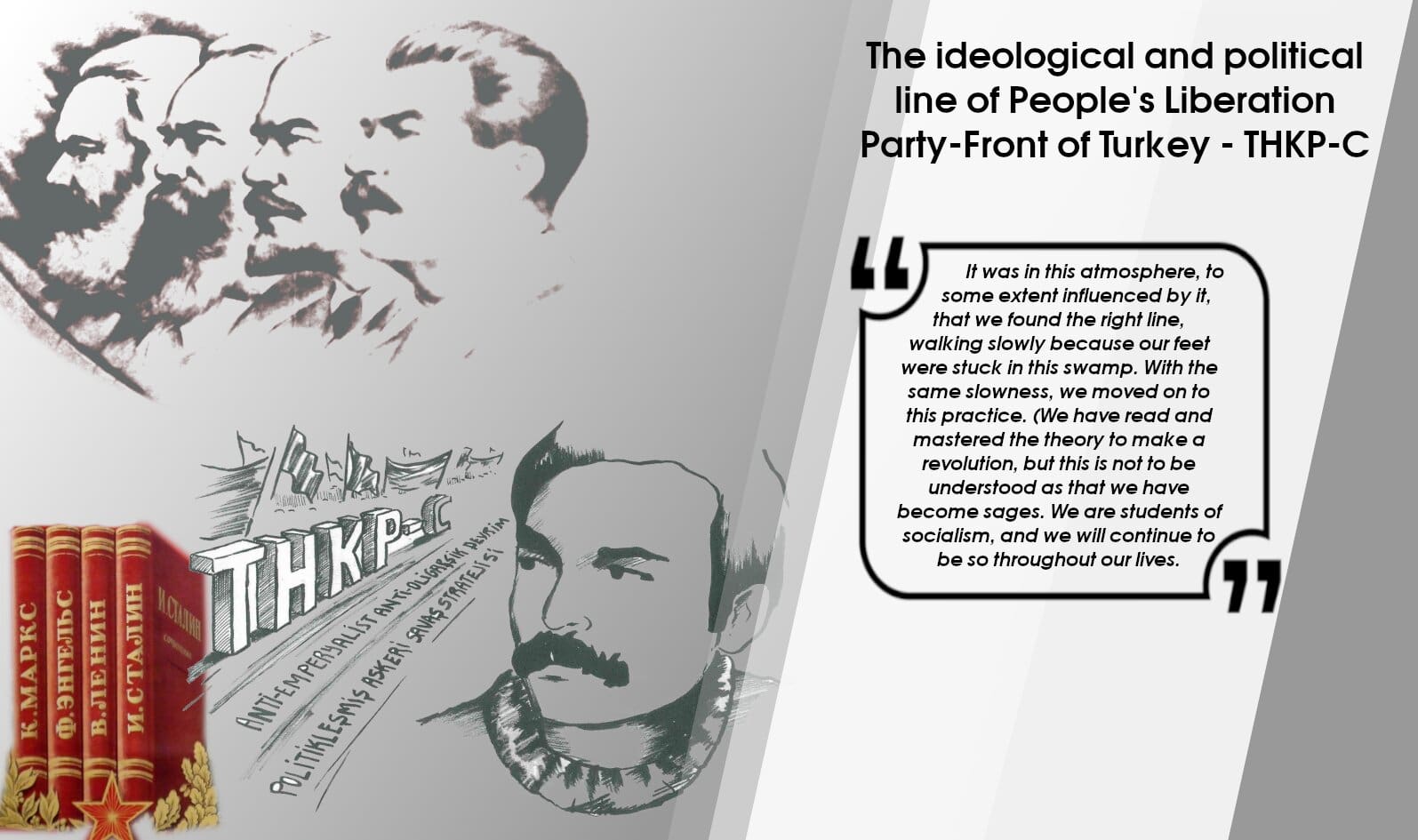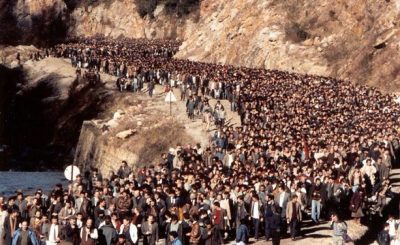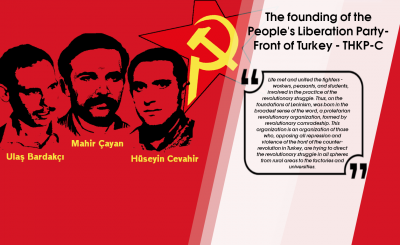The ideological and political views, the strategy for the revolution of THKP-C (People’s Liberation Party-Front of Turkey), are based on the Marxist-Leninist dialectical analysis of the realities of Turkey.
Mahir Çayan[1], who led a constant ideological struggle against all opportunists and revisionists who tried to implement in Turkey, mechanically without analyzing the ideas, policies, and strategies of the Communist Parties of other countries around the world, explained in a very clear way the path leading to a revolution in Turkey, in parts II and III of his book Continuous Revolution (in Turkish Kesintisiz Devrim). These views and ideas of Mahir Çayan, developed, matured, and clarified gradually over time in the course of the struggle.
While he waged a struggle against imperialism and oligarchy, at the same time he waged an irreconcilable ideological struggle against the opportunists and revisionists in the Workers’ Party of Turkey[2], in the circle around the socialist magazine Enlightenment[3], in the Federation of Idea Clubs[4], as well as in the ranks of the Revolutionary Youth[5]. The constant development of the theory, it’s deepening, and the coverage of all the problems of the revolution, are a natural result of the character of Mahir Çayan, who constantly was researching, his confidence in the ideology of Marxism-Leninism and his self-confidence, and his aspiration and desire to achieve the revolution.
At a time when fierce but meaningless disputes were taking place in the left movement, which has no use in solving the problems of the revolution, during which “hot water” was “discovered” several times a day, Mahir Çayan recounts the process of shaping the ideological and political line of THKP-C:
“It was in this atmosphere, to some extent influenced by it, that we found the right line, walking slowly because our feet were stuck in this swamp. With the same slowness, we moved on to this practice. (We have read and mastered the theory to make a revolution, but this is not to be understood as that we have become sages. We are students of socialism, and we will continue to be so throughout our lives.”
Topics such as the artificial balance that is inherent in neo-colonial countries such as Turkey, during the 3rd period of the general crisis of imperialism, the strategy of politicized war, were first put on the agenda by Mahir Çayan. Mahir Çayan examines the presence of imperialism in Turkey, in the context of neo-colonial relations developed in the period after the Second Imperialist War of Redistribution (World War II). According to his thesis, in countries like Turkey, imperialism has entered not by using its soldiers, tanks, and weapons, but through economic and military treaties, and has become an internal phenomenon (ie, there is a covert occupation). The main industries developed in terms of dependence on imperialism have developed social production, and have increased the so-called relative welfare, compared to the previous period (referring to the period before World War II).
In turn, the phenomenon called artificial balance is a natural result of neo-colonial relations. The increase in social production and relative welfare has, at first glance, mitigated the contradictions between exploiters and workers. The covert nature of the imperialist occupation prevented the discontent of the people from growing. The repressive structures of the state were organized to wage a civil war. The growth of the market inside the country, the transport and communication connections reaching even to its most remote corners, leading to the establishment of the authority of the state in all parts of the country. New and very powerful means of propaganda and methods of pacifying the masses have been developed.
All these are reasons for creating an artificial balance between the masses and the oligarchy. For these reasons, the masses who are dissatisfied and against the status quo remain in a passive position and do not take concrete action to express their dissatisfaction. For this reason, whoever embarks on the path of revolution must take into account the existence of artificial equilibrium in our country, and must determine its strategy and tactics according to this phenomenon.
The monopolistic bourgeoisie, which did not develop through its internal dynamics, was developed from the very beginning with the support of imperialism. For this reason, she is not able to dominate all production relations. She must share the power with the landlords and the feudal remnants. This rule can also be called oligarchic dictatorship or colonial-type fascism. This rule continues in the form of representative (facade) democracy, and sometimes even through its abolition.
Mahir Çayan, who theoretically clarifies the third period of the general crisis of imperialism, the relations in the system of neo-colonialism, the essence of oligarchy, and the phenomenon called artificial balance, defends the thesis that the revolutionary struggle that will be waged must be based on armed propaganda. On this subject he says the following:
“The ascertainment made by our Party, that the revolutionary struggle will come to victory through people’s war, accepting armed propaganda as the main method, and by drawing the masses of workers to the ranks of the revolution through the war of the vanguard, was guided by Marxism-Leninism, and from the relations and contradictions of the historical period in which we are and their reflection in our country. “
During that period, opportunists and revisionists tried to manipulate the masses by saying, “This is a duel between a small group of people and the ruling classes, this is anarchism, this is the course of the Narodniks.”
In response to the attempts to denigration and manipulation, against the ascertainment made by THKP-C about the need for “armed propaganda” and “war of the vanguard”, Mahir Çayan wrote the following:
“In those countries where the struggle for democratic and labor rights of the working masses is crushed with terror by the oligarchic dictatorship (even in the form of representative democracy), where the authority of the central government together with its army, police, etc., seems to be an “invincible” force in the eyes of the masses, and in which there is a covered occupation, armed propaganda is the main method of struggle by which a connection can be established with the masses, by which they can be drawn to the side of the revolution, through a large-scale campaign aimed the clarification of the political truths.
Armed propaganda is not a military struggle, but a political one. It is not an individual, but a mass method of struggle. That is, armed propaganda is by no means terrorism, as the pacifists claim.”
The fact that armed propaganda was accepted as the main method of struggle did not mean that the struggle for democratic and labor rights was rejected. The emphasis was on the fact that the masses need to be organized around actions and activities demanding democratic and labor rights, and this form of struggle must be subordinated to the armed struggle, and the two methods of struggle must be considered together, as one whole. The strategy in which armed propaganda is the main method and the democratic(legal) struggle is subordinated to it, and in which they are seen as two complementary areas and are continued in this way, is the strategy for carrying out a revolution in Turkey. The revolution will be carried out through a people’s war. But due to the specific conditions of our country, the people’s war must pass through the stage of the war of the vanguard. The strategy that encompasses all this is called the Strategy of Politicized Military Warfare (Politikleşmiş Askeri Savaş Stratejisi).
The strategic goal of THKP-C is to carry out an anti-imperialist and anti-oligarchic revolution. Based on the fact that the ruling classes in our country have merged with imperialism, and therefore can not be considered separately, Mahir Çayan, makes the following ascertainment:
“Because monopolistic capital in our country has not developed through its internal dynamics, and because the local big bourgeoisie has sprung up from the very beginning to merge with imperialism, our strategic goal is the anti-imperialist and anti-oligarchic revolution. “
THKP-C, which accepts as its basic principle the Unity of Political and Military Leadership, i.e. the political and military organization must be united under common leadership, according to the Strategy of Politicized Military Warfare will lead its struggle under the leadership of the working class.
Source: Karataş, Dursun. On the road to victory(Zafer Yolunda), Boran Yayınları, Istanbul, 2000. pp. 65-67.
Footnotes:
1- Marxist-Leninist, revolutionary, one of the founders of THKP-C and its leader until his martyrdom in 1972. He made a very important contribution to the theory of the communist movement in Turkey. His biography can be read at this address:
https://newsolution.fi/mahir-cayan-biography/
2- Workers’ Party of Turkey, in Turkish; Türkiye İşçi Partisi – TİP, was founded in 1961 by a group of trade unionists and intellectuals who supported the socialist ideas. The party has a revisionist and parliamentarist course. It is the first legal socialist party in Turkey to nominate members of parliament. Despite all its shortcomings, it is important to note that it contributes to some extent to the spread of the ideas of socialism among the masses. Many future revolutionaries, such as Mahir Çayan and Deniz Gezmiş were members of the party at the beginning of their acquaintance with the ideas of Marxism-Leninism.
3- Socialist magazine Enlightenment, in Turkish; Aydınlık Sosyalist Dergi was a Marxist theoretical magazine published between 1968 and 1971 by Turkish Marxist Mihri Belli and his associates. It ceased to exist in March 1971.
4- See note 5.
5- Revolutionary Youth, also known by the short name in Turkish; Dev-Genç, is a Marxist-Leninist youth organization in Turkey, having its origins in “Clubs for Ideas” found in various universities in the country in the second half of the 1950s (in Turkish Fikir Külüperi), which in the mid-1960s were unified into the Federation of Idea Clubs (Fikir Külüperi Federasyonu). It was during this period that the Marxist-Leninists, led by Mahir Çayan, succeeded in imposing a militant course on the organization as a turning point in the process of shaping Dev-Genç as a Marxist-Leninist organization uniting the youth with the October 1969 congress is a turning point in this process, and marks the date since it took the name by which it is known to this day.



